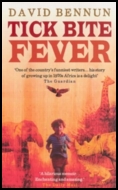| Text to separate 1 |  | Text to separate |  |
| Text to separate 1 | Tick Bite Fever | Text to separate | British As A Second Language |
|
Available now from Ebury Press:
British As A Second Language More details here Click here to buy it Also published by Ebury: Dave's highly acclaimed African memoir Tick Bite Fever |
| Starsailor/ Fountains of Wayne/ Tim Burgess/ Johnny Cash RIP [The Mail On Sunday, 2003] STARSAILOR SILENCE IS EASY EMI *** FOUNTAINS OF WAYNE WELCOME INTERSTATE MANAGERS Virgin *** TIM BURGESS I BELIEVE PIAS *** JOHNNY CASH RIP MAYBE SOMEONE has walked away from a Phil Spector recording session thinking, “That was fun - can't wait to do it again.” But I doubt it. With hindsight, many would count themselves lucky to have walked away at all. A pair of Spector productions have made it onto Starsailor's second album, Silence Is Easy. One is the title track, and it sums up the unwieldy alliance of two incongruous modes, being in essence a thunderous whinge. Although Spector's Wall of Sound is evidently a major influence on Starsailor's heavy-duty, melodramatic pop, it was created as a backdrop to adolescent passions. It perfectly expressed the sheer strength of romantic feeling involved. It wasn't made for self-pity. Starsailor are descendants of a musical movement that a few years back was dubbed “The New Seriousness”. Somehow that winning phrase didn't capture the public imagination. Starsailor are not just serious, they are steeped in arse-aching solemnity. The result is an album so stodgy that exposure to it may induce catalepsy in adherents of the Atkins diet. The odd thing is, Starsailor aren't a bad band. Taken individually, there are splendid tracks here - the thumping Music Was Saved; the discofied Four To The Floor; Shark Food and White Dove, neither of which would be out of place on an early Neil Young album. In fact, none of the songs are dreadful. It's only when you play the album end to end that you duplicate the cumulative effect of eating a cheap foam-rubber sofabed, complete with cushions. So, as Tommy Cooper would have advised: don't do it, then. Fountains of Wayne put me in mind of Weezer, or a breezier Eels. Their songs, each a neat cameo portrait of an American life, usually land just the right side of the fine line between quirky and unbearable. With marginally less command of nuance they might be Timbuk 3, or worse still, They Might Be Giants. The band are at their best when, rather than sink into pastiche, they stick to their own brisk, chunky power pop or dreamlike MOR. There's not much point in hearing Welcome Interstate Managers unless you can sit and concentrate. It's one of those rare records that repays attention to its lyrics, which manage to deal warmly and wryly with frustration, failure, self-delusion, hopeless fantasies and doomed ambitions. Tim Burgess is the singer from that undervalued outfit, The Charlatans. His first solo album is lovable, the way an eight-year-old boy trying to shave is lovable. Tim so badly wants to be Curtis Mayfield and Gram Parsons that occasionally he comes close. I Believe isn't a great record, but it does live up to its title. The pure joy Burgess takes in emulating his heroes lends it vigour and charm even when it wants for inspiration. And in the swinging, exuberant soul numbers Say Yes and I Believe In The Spirit, he's created songs which approach his band's best work but in no way duplicate it. Sweet music - “sweet” in the cuddly puppy sense. How do you gauge the value of an artist like Johnny Cash? Perhaps by saying his death at 71 is, in terms of musical vitality, comparable to losing Jimi Hendrix at 27. Cash's status as a country titan and innovator was built upon his work for Sun in the 1950s (such as I Walk The Line) and Columbia in the 1960s (Johnny Cash at Folsom Prison). It's worth noting that the nascent careers of Bob Dylan and Kris Kristofferson might not have survived without his support. In his final decade, Cash's partnership with Rick Rubin of American Recordings created four albums the equal of anything in his astonishing oeuvre. As modern devotees looked back to country's raw-boned origins, Cash moved in the opposite direction, establishing a new reputation as a superb interpretive singer of contemporary songs. He didn't so much cover these as uncover them, starkly revealing an elemental power that the writers themselves could not often command. His version of U2's One stands out as a breathtaking overview of his three core themes - Love, God and Death. Several times Cash narrowly eluded the last of this troika. There is no question it finally caught him while he still had great music in him. All material on this site is copyrighted © to David Bennun and may not be reprinted or reused without permission. Right? Right. Back to Music Reviews
Back to Pop |
| Text to separate 1 |  | Text to separate |  |
| Text to separate 1 | Tick Bite Fever | Text to separate | British As A Second Language |